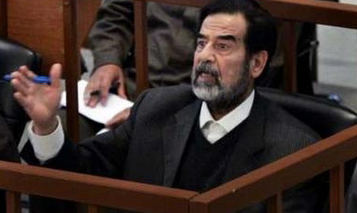Saddam admits razing orchards of convicts
2/3/2006 15:08

Former Iraqi president Saddam Hussein admitted on Wednesday that he ordered
the razing of the orchards of those convicts in Dujail after their assassination
attempt on him in 1982.
Saddam said he was ready to take the commanding
responsibility for demolishing orchards, adding that he wanted to save trouble
for the court.
"I was the one who signed the decision of demolishing the
orchids," Saddam said.
"I was attacked by a machine-gun from some 50 meters,
bullets passed so close," Saddam told the court.
According to the Iraqi law,
Saddam said, the state has the right to confiscate any land for common interest
with symbolic compensation.
But, "I changed the compensation into profitable
compensation," Saddam said.
He also said it was him who ordered the then
Revolutionary Court to prosecute and try those who involved in the assassination
attempt.
On Wednesday, the trial of Saddam Hussein and his seven aides
resumed in a Baghdad court, with absence of Saddam's chief attorney, Khalil
al-Dulaimi, who walked out during Tuesday's session.
Saddam, who looked
quiet, was the first of the eight defendants to enter the court as the session
started at 11:30 a.m. (1030 GMT) on the second straight day of
hearings.
Tuesday and Wednesday's trial focused on documents presented by
chief prosecutor Jaafar al-Moussawi.
During Wednesday's session, al-Moussawi
presented several documents. One of them, dated from March 31, 1987, said that
the last batch on the death list in the northern village of Dujail had been
executed.
Al-Moussawi tried to link Saddam and his aides to atrocities
perpetrated in the aftermath of Dujail massacre, saying that the documents
submitted to the court proved that the 148 victims were executed without
trial.
"Some of those victims were sued to court after they were liquidated
during the interrogations," he said.
The defendants questioned the documents,
all dated back to the mid-1980s, when al-Moussawi read some excerpts related to
the Dujail case.
The court also heard a recording tape of a dialogue between
Saddam and AbdulGhani Abdul Ghafour, a former member of the dissolved Baath
regional command, about the demolishing of Dujail orchards and other Iraqi areas
such as the marshes in the south.
On Tuesday, al-Moussawi told reporters that
there were seven more witnesses, one of whom was Saadoun Shaker, former interior
minister during Dujail massacre and six from Dujal residents, one of whom had
died.
In Wednesday's session, the chief prosecutor read some testimonies of
some witnesses in their absence.
But Saadoun Shaker did testify, as
al-Moussawi said Shaker is now a defendant and no more a witness.
Taha Yassin
Ramadan, one of the eight defendants, complained that the prosecutor has turned
Shaker from witness into a defendant after he refused to testify against Saddam
and his co- defendants.
Al-Moussawi rejected Ramadan's accusation, saying
that he punished Shaker because Shaker insulted him.
Several of the lawyers
appointed by the court also spoke out, saying that naming witness alone is not
accurate enough.
Ramadan also argued the credibility of the
testimonies.
"How can we be sure about the credibility of the testimony? The
chief prosecutor is not acting like a chief prosecutor, he is an enemy to us
trying to hurt us by every possibly way," he said.
Another defendant Barzan
Ibrahim said, "It is unjust to bring in street witnesses without specific names
and personal information for testimony. Maybe those witnesses have personal
motive against me, so witness identity should be clarified."
The chief judge
announced the trial of Saddam Hussein, which began in October 2005, would be
adjourned until March 12.
Saddam and seven of his high-profile defendants are
facing charges of crimes against humanity, including the killing of 148 Shiite
men in Dujail after a failed assassination attempt on Saddam in 1982.
If
convicted of the charges, Saddam and his aides might face the death penalty.
Xinhua news
|



